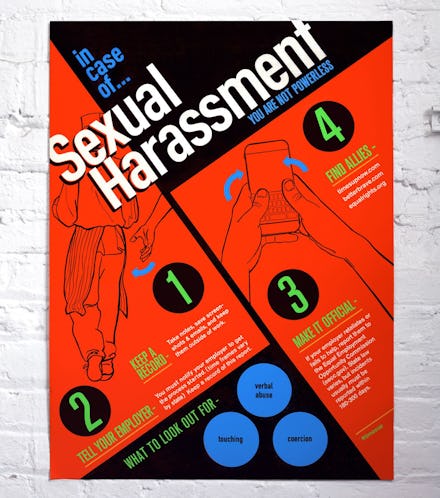Why every restaurant should display this sexual harassment PSA on its walls

It’s an unfortunate but undeniable reality that sexual harassment plagues virtually all kinds of workplaces, including the restaurant industry.
From 1995 to 2016, employees in full-service restaurants filed more claims of sexual harassment than did workers in any other field, according to data obtained by BuzzFeed. Emboldened in part by the cultivation of the #MeToo movement, many former and current restaurant employees have recently called out numerous male chefs for sexual misconduct.
That’s one of the reasons why restaurateur Karen Leibowitz, who co-owns San Francisco’s The Perennial, created a poster in the style of a public service announcement to empower those who experience or witness sexual harassment. The poster, which was brought to life by graphic designer Kelli Anderson, is modeled after the New York City Council’s 1989 artwork that gives instructions for the Heimlich maneuver.
According to Anderson, Leibowitz was talking to other concerned restaurateurs at an industry dinner earlier this year, when she realized laws against sexual harassment are of little practical use when no one is aware of them. Similar to the required minimum wage posters that inform employees of their rights regarding pay, Leibowitz decided that a visual reminder of what restaurant workers should do when experiencing sexual harassment was needed.
“I think having a physical aid to memory is really good,” Anderson said. “This legislation has existed for a while, but the difference between the reality of what actually happens in the workspace and what peoples’ rights are — there’s an ocean between them.”
A version of the choking poster on which the sexual harassment PSA is based is required to be displayed in New York City eateries and is ubiquitous in restaurant kitchens around the country. Anderson said she hopes that with enough circulation, this sexual harassment sign will also be mandated.
The poster was intentionally designed to stand out from the typical Heimlich maneuver poster to which the public has grown accustomed.
“I think most people visually edit [these signs] out of their experience,” Anderson said. “We thought by following the style of the poster — but making the colors extremely different — it would almost seem like a glitch and cause people to do a double take and pay attention.”
“It reminds them they have the right to be uncomfortable.” — Kelli Anderson
“There’s been so much talk about what to do regarding harassment, and I’m heartened that this is an actual, tangible thing that can make a difference,” Anderson told Cherry Bombe.
The magazine is selling the poster as part of its #86This project. Anderson and Leibowitz wanted the poster to “help restaurant employees identify, report and stop sexual harassment in the workplace,” according to the product’s description.
The poster, which can be purchased for $10 or downloaded for free, is available in both English and Spanish and is currently being translated to Chinese.
“Mostly, what we’re hearing from people who work at restaurants is that they’ve kind of taken for granted that sexual harassment is part of the deal [in] the restaurant industry,” Anderson told Mic. “I think people like the idea of having a visual reminder that is in their physical space. It reminds them they have the right to [be] uncomfortable. Their safety is important not only to them, but also to the management, to the owner, to the government. That’s why these laws exist.”
Sexual harassment problems in restaurants aren’t just contained to workers, either. At a recent Food Politics panel at New York University, Kat Kinsman, author of Hi, Anxiety: Life With a Bad Case of Nerves, said that in her time as a food journalist, two male chefs have bitten her on two separate occasions, leaving marks and bruises.
“I cannot think of much greater entitlement than that,” Kinsman said during the panel.
Kinsman has made it her focus to interview as many female chefs as she can, explaining that past interviewees have lacked confidence in her because of the undercurrent of toxic masculinity in restaurant culture.
“I try to think of the straight white men last,” she said at the panel. “Y’all have had a really great run.”